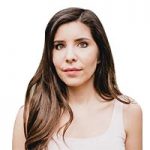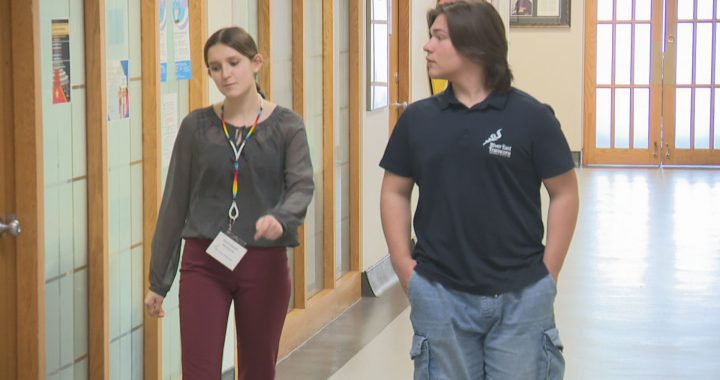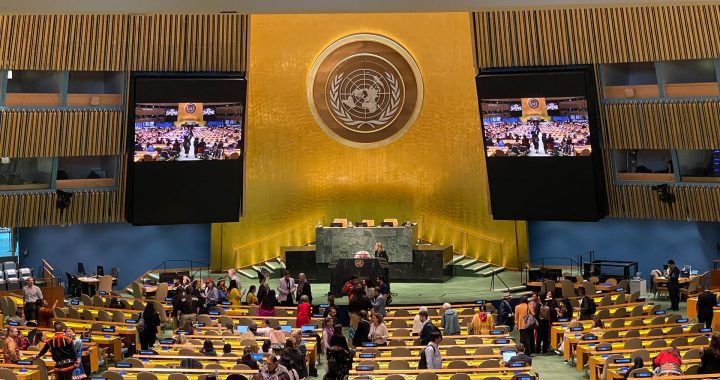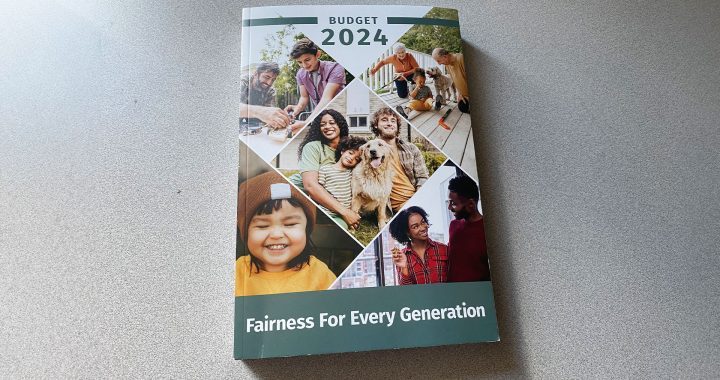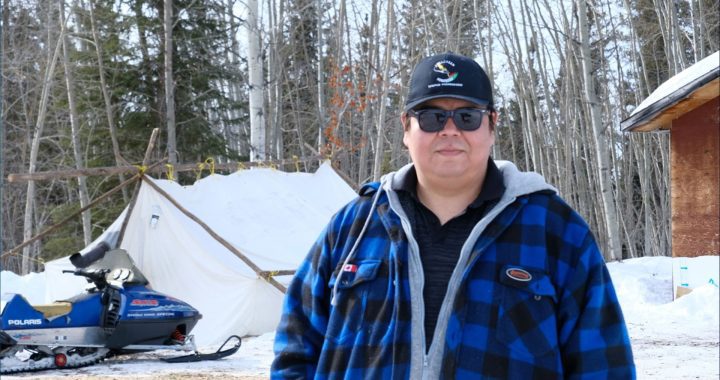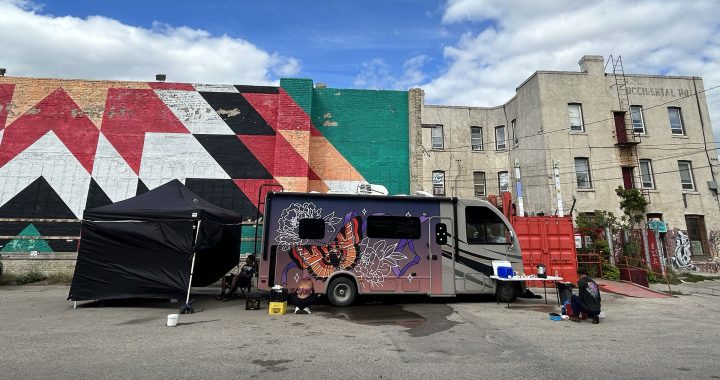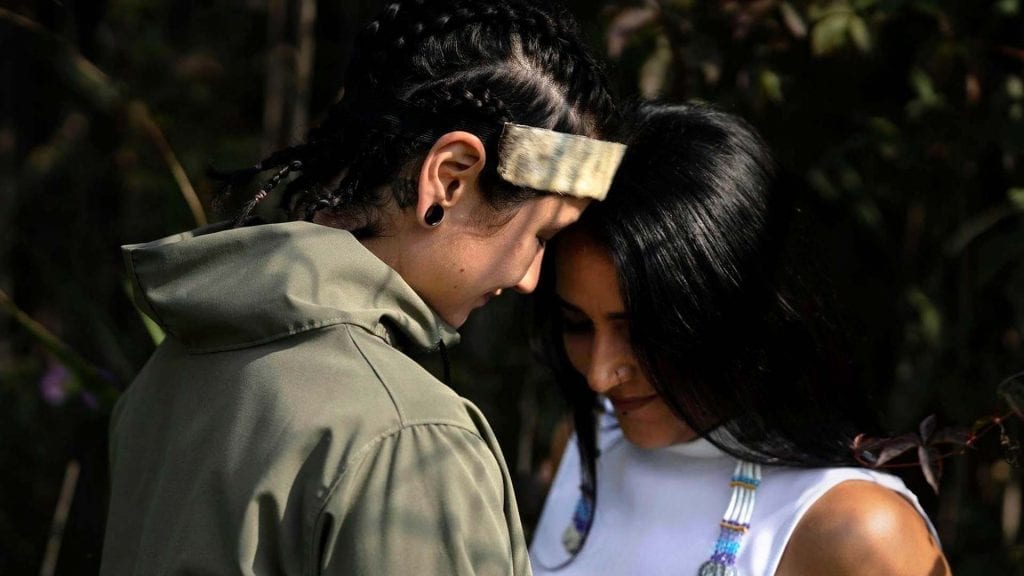
Nanook Gordon and Brianna Olsen Pitawanakwat started trying for a baby in 2020. Photo by Ian Maracle
For Brianna Olsen Pitawanakwat, a queer Anishinaabekwe (Anishinaabe woman), the journey to motherhood hasn’t been easy.
As a mature birthing person, not only does she worry about things like her egg count, but she also has to deal with heteronormative assumptions and racism, she says.
Olsen Pitawanakwat belongs to Wiikwemkoong Unceded Territory and lives in Toronto with her Two Spirit fiancé Nanook Gordon.
When the couple sought access to reproductive support in Toronto last year, she says they experienced “racist, discriminatory and abusive” behavior from a nurse practitioner at Anishnawbe Health.
She feels systemic racism and a lack of education and queer representation in the health-care system are to blame.
Journey to motherhood
Olsen Pitawanakwat was 35 when she began trying for a baby. After finding a donor, she and Gordon planned for an informal insemination process.
“That means it’s not through, like, a fertility clinic or anything. We’re just going to do it on our own with the donor,” Olsen Pitawanakwat tells IndigiNews.
Wanting to have her fertility assessed, she visited Anishnawbe Health in Toronto in June 2020, where she says she asked a nurse practitioner to refer her for a hysterosalpingogram or another procedure that would assess the health of her reproductive organs — and was declined.
“This [test] is a very common thing that women [at] my age get and people that are Two Spirit,” she says. “I told her in the conversation that ‘I’m Two Spirit, my partner and I … we’re going to do insemination.’”
She says the nurse practitioner insisted that she needed a referral from her doula, but it was her understanding that the nurse practitioner could refer her for the test. Olsen Pitawanakwat is a birth worker and a doula, and she says she’d researched fertility support options and consulted with her doula, an Indigenous Healer, and her own mother, whom she says is a seasoned registered nurse.
After this experience, Olsen Pitawanakwat sent a complaint letter to Anishnawbe Health Toronto (AHT) on Jan. 18, 2021 about her experience with the nurse practitioner, and she’s currently awaiting a reply.
“It was in my right as a patient to ask for this resource and referral,” she writes in the letter, adding that she “felt incredibly embarrassed that [the nurse practitioner] was not understanding the need for this procedure as a starting place for insemination and diminished as a Two [S]pirit person even having to explain the need for this resource.
“I explained that an Indigenous Healer had also encouraged the procedure, and felt spiritually defeated when [the nurse practitioner — who Olsen Pitawanakwat says is white] would not take stock to what I was trying to explain.
“I was misled, dissuaded and discouraged from the steps it will take to become pregnant as a Queer Anishinaabe woman,” she writes.
Dr. Suzanne Shoush, a family doctor who says she has been practicing for 10 years, says nurse practitioners can “absolutely order ultrasounds.” And she’s pretty sure they can refer patients for sonohystograms and hysterosalpingograms — the specific tests Olsen Pitawanakwat was requesting.
“If they are not able to order these, they can request the physician they work with to order, and they can always make a referral to the fertility clinic or gynaecologist for these to be done as well,” Shoush writes in an email to IndigiNews.
“It was an absolute lack of knowledge on [the nurse practitioner’s] part,” says Olsen Pitawanakwat. “I was bawling my eyes out. I was extremely triggered.”
After the conversation about the referral, Olsen Pitawanakwat says she decided to go ahead with the routine pap smear she’d planned to receive as part of her visit to the clinic.
“We went through with it,” she writes in the letter. “I laid crying on the exam table through the entire pap smear.”
“Now, I will never ever go to a doctor to ask for anything for my sexual reproductive health care unless I know that they’re safe for queer people, because of the harm that came from that situation,” she says.
IndigiNews reached out to Anishnawbe Health Toronto for comment, giving them a week to respond, but did not receive a response by deadline.
Barriers to care for Two Spirit people
After experiencing what Olsen Pitawanakwat describes as “obstetric violence” at the Toronto clinic, she reached out to her network and was referred to Shoush.
Shoush says she understands why being denied a referral for service was such an upsetting experience for Olsen Pitawanakwat.
“Those delays can be really significant, especially because there are issues with fertility declining with age, there’s issues with costs involved, and there’s issues with procuring, you know, the needed donors,” she says.
It’s also safe to assume that an Indigenous person, particularly a Two Spirit person, has done some research before seeking support in the health-care system, she says.
Seeking support in the system is “not the first thing that people often do in the Two Spirit community and in Indigenous communities across Canada,” she says. “There’s a lot of systemic racism and exclusion and discrimination, a lot of reasons for Indigenous people not to seek care.”
Experiences of anti-Indigenous racism in B.C.’s health-care system were thoroughly documented in a 2020 investigation led by Mary Ellen Turpel-Lafond, who is a law professor at the University of British Columbia.
“First Nations women clearly are experiencing lower access to health services from the prenatal period and this is a major concern,” Turpel-Lafond said in an update to the report on Feb 4.
“But on top of that, there’s intersectionality of also being queer or Two Spirit,” says Shoush. “And we see that the intersectionality is an added layer of barrier, an added layer of exclusion, or an added layer of health care stereotype threat.”
Shoush sees the lack of Indigenous sperm donors as an example of the system’s failure to serve Two Spirit people.
“We see a significant lack of access to both eggs and sperm from Indigenous First Nations, Inuit and Métis donors,” she says.
“We see that it is extremely difficult for Two Spirit, queer Indigenous people to find culturally safe care that understands and honors … the knowledge that they already hold and the knowledge that comes from the community and the traditional teachings on how they would like to pursue issues like sexuality, fertility, gender identity and well-being.”
Olson Pitawanakwat says Shoush, on the other hand, was “so kind and so wonderful” as she guided them through the insemination process — integrating Indigenous knowledge and providing a referral to what she calls “one of the best fertility clinics in the country.”
“She had an hour-long conversation with me about my rights and the process of getting pregnant for insemination,” says Olson Pitawanakwat.
Shoush also coached the couple on “the spiritual, like, Indigenous-based concept around insemination,” teaching them how to “meditate on the process of the sperm meeting the egg” and envision a successful pregnancy.
Shoush says her mother is Coast Salish and her father is Black from North Africa.
“One of the most important things when you’re seeking health care is that the person providing care for you can see humanity … your individual dignity [and] worth,” says Shoush.
“And that’s something that can be extremely challenging for Two Spirit Indigenous people given just systemic racism in health care.”
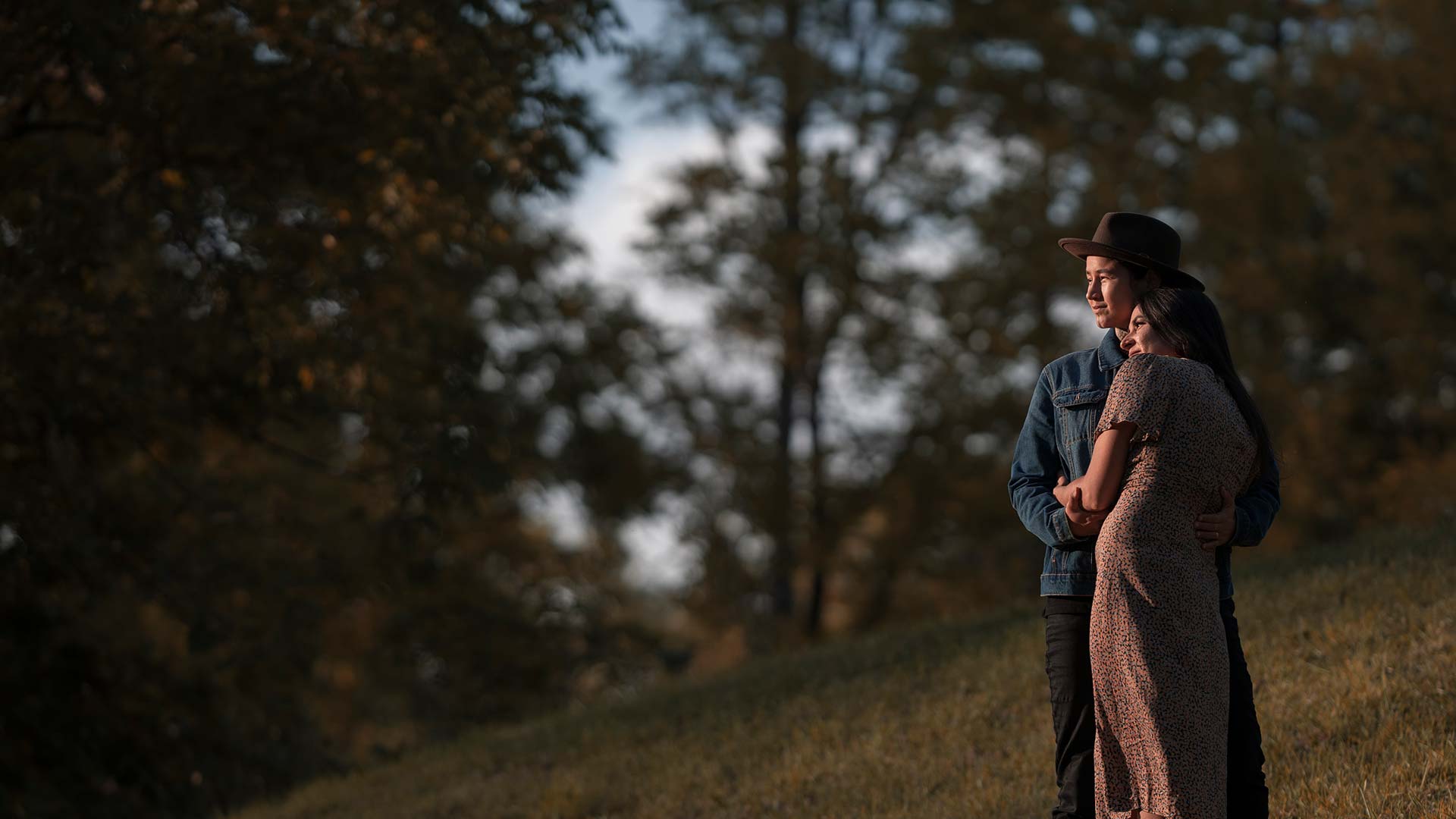
Need for education and representation
“Our health care system was not designed for or by Indigenous people,” says Shoush.
There is a “lack of culturally appropriate care” and a lack of health care providers “who can relate to a history and a knowledge and tradition of Indigenous communities and peoples,” she says.
In 2019, Shoush became the first-ever Indigenous Health Faculty Lead at the University of Toronto Department of Family and Community Medicine.
“We really have to start from the bottom up … from the way that we educate people all the way from, you know, elementary school to medical school,” she says.
An ideal education would include “Indigenous cultural safety training and competencies and cultural humility, and then also honouring and understanding the sovereignty of Indigenous Peoples,” says Shoush.
“When there’s sovereignty in health care, when there’s … self-governance and self-determination, that will be the most critical step to creating safe spaces for Two Spirit people.”
Olsen Pitawanakwat would also like to see “a really thorough education about gender diversity and about 2SLGBTQA experiences within birth work or fertility or pregnancy or birthing within the medical community.”
Ideally, there would also be more queer and Two Spirit representation in the birth worker community — more Two Spirit doulas and midwives, she says.
More queer supports and represesentation would serve as a check against the default heteronormative perspective, she says.
“I’ve always noticed, a heteronormative perspective from any and all health-care providers,” she says, adding that practitioners regularly assume she has a male partner when she goes in to access sexual reproductive health care. This is something she hears from other queer and Two Spirit folks through her work as a doula, too, she says.
Sarah Hunt has written about the harm done to Two Spirit people by a health-care system that too often renders them “invisible.”
“The structure, design and delivery of health care are deeply impacted by homophobia, transphobia, cisnormativity and heterosexism, creating barriers for Two-Spirit people as they try to access health services,” writes Hunt, who works as an assistant professor at the University of Victoria.
Hunt, whose research focuses on Indigenous political ecologies and Indigenous and decolonial methodologies, says there is a lack of research on the experiences of Two Spirit people in our health-care system.
“The systemic marginalization of sexual and gender minorities and the rupturing of traditional Two-Spirit roles within Aboriginal cultures have resulted in Two-Spirit people’s lives being made invisible within much Aboriginal health literature.”
Even Turpel-Lafond’s recent report on anti-Indigenous racism in B.C.’s health-care system, In Plain Sight, does not include the words “Two Spirit” or “queer.”
Olsen Pitawanakwat says her experience of the system makes her question how accessible birthing supports are for others facing even more barriers and marginalization.
“What about queer couples that are poor? What about couples that are Black or [transgender], or any of these demographics that are so ostracized and not recognized by the system?
“We’re so lucky that we have all these people that come back us up, and we’re so lucky we have the ability to speak out about what happened,” she says. “Whereas I think a lot of people don’t.”
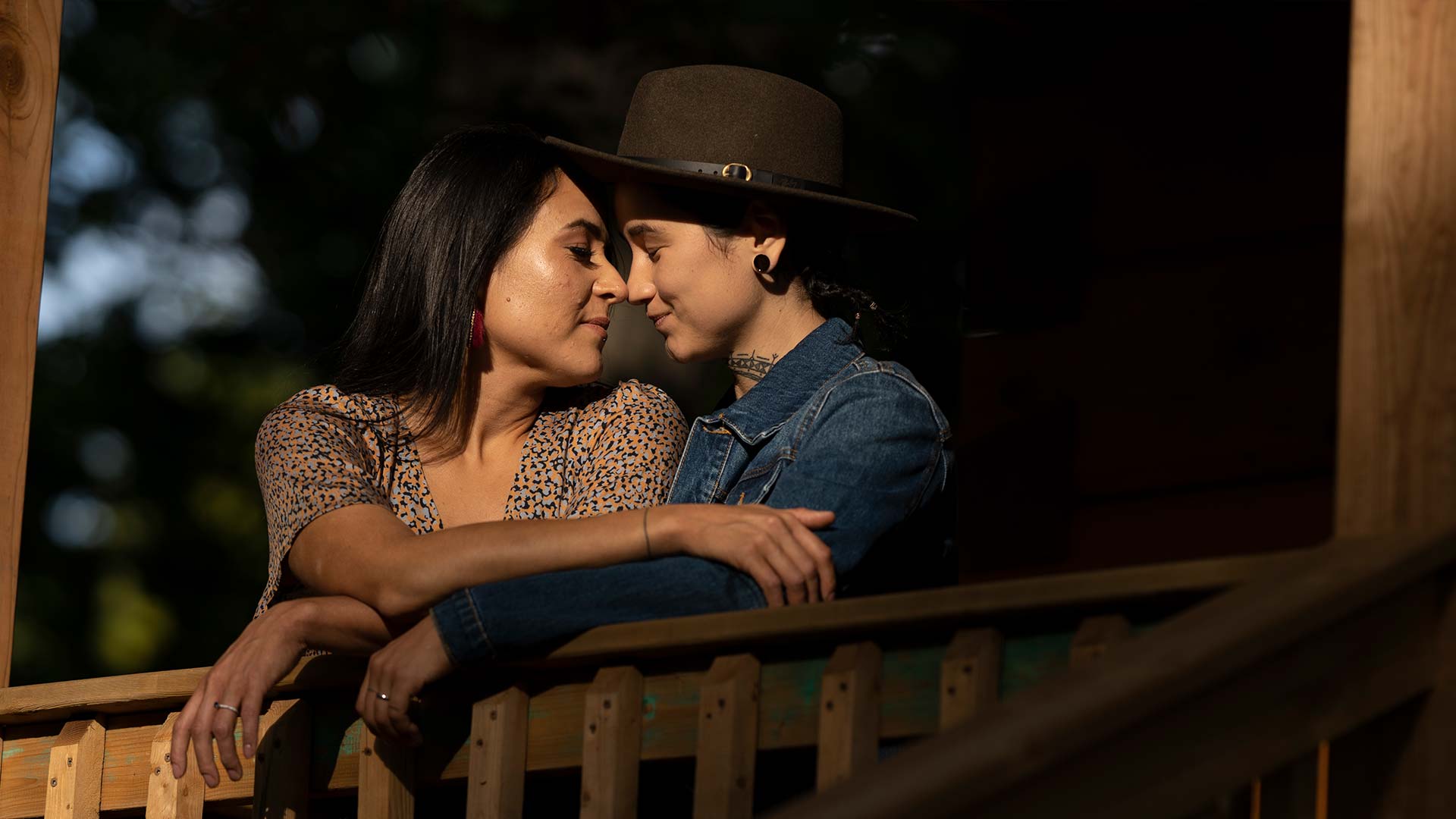
‘Birth is a ceremony’
As they continue on their birthing journey, Olson Pitawanakwat says she and Gordon are being mentored by another Two Spirit couple who successfully used insemination.
“They’re a very well known powwow couple,” she says, adding that they responded enthusiastically when they heard Olson Pitawanakwat and Gordon were trying for a baby this way.
“They literally were over the moon … They were like, ‘Can we have a Zoom call, like, immediately? We need to talk about this more — nobody talks about this,’” says Olson Pitawanakwat.
She says she and Gordon have a long-term goal of starting a collective dedicated to providing insemination support for queer folks across the country.
“There are so many Two Spirit families that have every right to have a child and to bring a child into this world — a Native child,” she says. “How can we make that more available, you know? So it’s less hard for everybody who has to do it, because for us it was hard.”
Olson Pitawanakwat says she began offering pre and postnatal support as an outreach worker in 2008, and she became a full-spectrum doula in 2014. She holds a master’s degree in social work, and she says her great-great-great-great-grandmother was a midwife in her community, Wiikwemkoong.
“Her name was Gchimama, so it means like big mother or like older mother,” she says. “My family would always talk about how I carried her spirit or just a lot of the teachings that she held.”
Olson Pitawanakwat believes that birth is a ceremony.
“That’s something that I’ve been taught by the midwives and by all of the birth workers that I’ve been honoured and really privileged to work alongside,” she says.
“We’re coming from a time when we were sterilized and when we were put in residential schools, or when we were so traumatized that we couldn’t carry on that legacy for communities,” she says.
“I just hope that we can heal that by bringing children into this world and having dignified beautiful amazing experiences with birth, regardless of what kind of sexual or gender identity that you have.”
With editorial support from Bayleigh Marelj.




